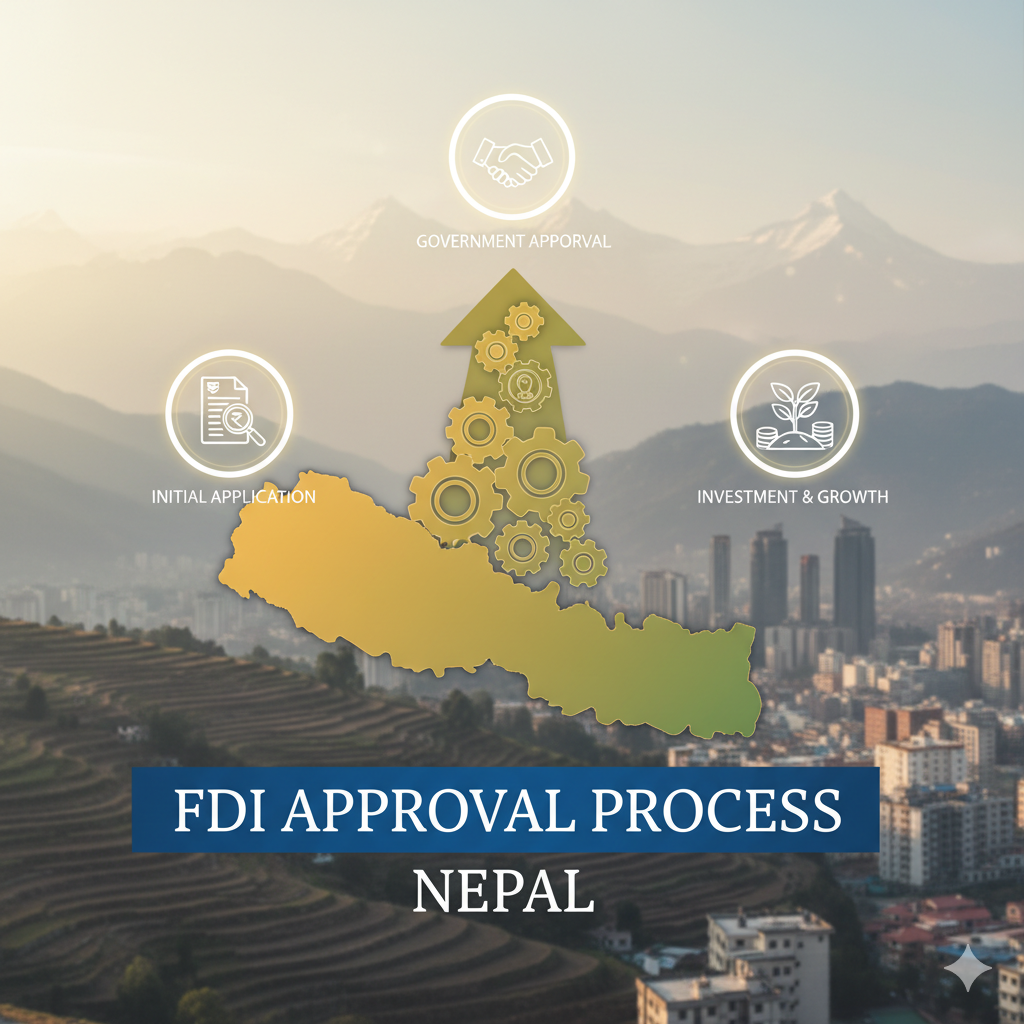- info@corporatenp.com
- World Trade Center KTM
FDI Approval Process Nepal

FDI Approval Process Nepal: A 2025 Investor Guide
Embarking on a business venture in Nepal requires a clear understanding of the foreign direct investment approval process in Nepal. This comprehensive guide is designed for international investors, providing a detailed roadmap through the legalities, procedures, and practical steps necessary for successful investment approval. Grounded in the Foreign Investment and Technology Transfer Act 2019 (FITTA 2019), this resource demystifies the process, ensuring you are well-equipped to establish your business presence in this emerging market.
Understanding the Legal Framework: FITTA 2019
The foundation for all foreign investment in Nepal is the Foreign Investment and Technology Transfer Act, 2019 (FITTA 2019). This legislation replaced the previous act from 1992, aiming to create a more liberal, transparent, and investment-friendly environment.
What is FITTA 2019? FITTA 2019 is the primary law that governs foreign investment in Nepal. It defines foreign investment, outlines the sectors open for investment, specifies the approval mechanisms, and details the rights and protections afforded to foreign investors. As per Section 3 of FITTA 2019, foreign investment is defined as an investment made by a foreign investor in shares, or as a loan or facility in any form of foreign currency.
Why was FITTA 2019 introduced? The Act was introduced to streamline the FDI approval Nepal process, attract higher quality investment, and align Nepal's investment policies with global standards. It clarifies the roles of key government bodies like the Department of Industry (DoI) and the Investment Board Nepal (IBN).
The FDI Approval Process: A Step-by-Step Guide
Navigating the foreign investment process Nepal involves a series of structured steps. The pathway to approval depends on the scale and sector of your investment.
Step 1: Preliminary Application and Inquiry
Before submitting a formal application, it is prudent for investors to conduct a preliminary inquiry with the relevant authority. This helps to confirm the feasibility of the proposed investment and understand any specific sectoral conditions.
Step 2: Submission of the Formal Application
The formal foreign investment registration Nepal application must be submitted to the designated authority. The correct authority is determined by the scale of your proposed investment. Specifically, for investments up to NPR 5 billion or in industries not specified for the Investment Board, the application is submitted to the Department of Industry (DoI). On the other hand, for investments exceeding NPR 5 billion or in specific large-scale projects such as hydropower over 50 MW or major infrastructure, the application must be filed with the Investment Board Nepal (IBN). The application must be made in the prescribed format, as detailed in the Foreign Investment and Technology Transfer Rules, 2020.
Step 3: Document Submission and Verification
A crucial part of the Nepal FDI application process is the submission of all required documents. The authorities will meticulously verify these documents to ensure compliance with legal requirements. Any discrepancies can lead to delays or rejection, making accuracy paramount.
Step 4: Review and Approval by the Authority
The DoI or IBN will review the application against the provisions of FITTA 2019 and other relevant policies. They will assess the project's viability, its contribution to the Nepalese economy, and its compliance with sectoral restrictions.
Step 5: Issuance of Foreign Investment Approval Letter
Upon successful review, the authority will issue a Foreign Investment Approval Letter. This letter is a critical document that grants permission to proceed with the investment. It will specify the approved amount of investment, the sector, and any conditions that must be met.
Step 6: Post-Approval Company Registration
After receiving the FDI approval, the investor must proceed to register the company with the Office of the Company Registrar (OCR) under the Company Act 2063. The FDI approval letter is a mandatory document for this registration.
Key Requirements for Foreign Investors
To successfully navigate the investment approval procedure Nepal, foreign investors must prepare a comprehensive set of documents and meet specific requirements.
Essential Documents Checklist
The required documents are designed to establish the identity, credibility, and financial capacity of the investor. A complete and accurate submission is paramount for a smooth approval process. Key documents include the prescribed application form, a detailed project proposal, proof of the investor's identity (like a passport), and a declaration of the source of funds. Depending on the investment structure, additional documents such as a joint venture agreement or a technology transfer agreement may also be necessary.
Financial and Technical Provisions
Investors must demonstrate the financial capacity to fund the proposed investment. If the investment involves technology transfer, detailed agreements outlining the terms of this transfer must also be submitted, as per Section 8 of FITTA 2019.
Sector-Specific Rules and Restrictions
Not all sectors in Nepal are open for foreign investment. FITTA 2019 clearly delineates the sectors that are prohibited, restricted, and open.
Prohibited Sectors for FDI
Section 5 of FITTA 2019 specifies certain sectors that are completely closed to foreign investment. These are typically sensitive industries related to national security, public health, and traditional small-scale industries. Examples of prohibited sectors include cottage industries, personal security services, arms and ammunition production, and retail business with a capital below a certain threshold (currently NPR 20 million in Kathmandu and NPR 10 million in other areas, though this is subject to policy changes).
Restricted Sectors (Require Prior Approval)
Some sectors are not closed but require special approval or have conditions attached. These are listed in Section 6 of FITTA 2019 and may include areas such as telecommunications services, air transport services, and banking and financial institutions, which are regulated by Nepal Rastra Bank. The media and publication sector also falls under this category of restricted investment.
Open Sectors for FDI
The majority of sectors are open for foreign investment Nepal. Section 7 of FITTA 2019 actively encourages investment in key growth areas such as hydroelectricity, tourism and hospitality, information technology, manufacturing (excluding prohibited items), agriculture-based industries, and infrastructure development.
Investor Rights and Protections
FITTA 2019 provides several protections to foreign investors to build confidence and ensure a stable investment environment.
Repatriation of Funds
A key concern for any foreign investor requirements Nepal is the ability to repatriate profits and capital. Section 16 of FITTA 2019 guarantees that foreign investors can repatriate the amount received from the sale of shares, all profits and dividends earned from the investment, and the amount received as principal and interest on foreign loans. This repatriation is subject to Nepalese tax laws and foreign exchange regulations governed by the Nepal Rastra Bank.
Dispute Settlement Mechanism
Section 19 of FITTA 2019 outlines a clear dispute settlement mechanism. In case of a dispute between a foreign investor and the Government of Nepal, efforts will be made for an amicable settlement through mutual consultation. If unresolved, the dispute can be referred to arbitration as per the rules set forth in the Act.
Protection Against Nationalization
The Act provides assurance against nationalization except for a public cause, and in such a case, it guarantees prompt compensation at the prevailing market value.
5. Data Tables
Table 1: Required Documents Checklist for FDI Approval in Nepal
| Document Required | Purpose/Description |
|---|---|
| Application Form | Prescribed form (Form A of FITTA Rules 2020) for FDI approval. |
| Project Proposal/Business Plan | Detailed description of the proposed business, its objectives, and economic benefits. |
| Copy of Passport/Citizenship | For identification of the foreign investor(s). |
| Bio-data of Investors | Professional and personal background of key personnel. |
| Source of Funds Statement | Declaration and evidence of the legal source of investment funds. |
| Company Registration (if applicable) | Certificate of incorporation from the investor's home country. |
| Joint Venture Agreement (if applicable) | Detailed agreement between the foreign and Nepalese partner(s). |
| Technology Transfer Agreement (if applicable) | If the investment involves technology transfer, as per Section 8 of FITTA 2019. |
| Letter of Intent (if applicable) | From a potential Nepalese partner or client. |
| Tax Clearance Certificate | From the investor's home country, if applicable. |
Table 2: Processing Timelines by Investment Type
| Authority | Investment Type/Scale | Standard Processing Timeline |
|---|---|---|
| Department of Industry (DoI) | Investments up to NPR 5 billion. | 30 days from receipt of complete application. |
| Investment Board Nepal (IBN) | Investments exceeding NPR 5 billion or in specified large-scale sectors. | 60 days from receipt of complete application. |
Note: Timelines may extend if the application requires inter-agency consultation or if submitted documents are incomplete.
Table 3: Sector-wise FDI Restrictions and Requirements per FITTA 2019
| Sector | Status for FDI | Key Conditions/Notes |
|---|---|---|
| Cottage Industries | Prohibited | Fully reserved for Nepalese nationals. |
| Retail Business | Restricted | Minimum investment of NPR 20 million in Kathmandu Valley and NPR 10 million elsewhere. |
| Hydropower | Open | Projects 50 MW handled by IBN; smaller projects by DoI. |
| Telecommunications | Restricted | Requires prior approval from the Ministry of Communication. |
| Banking & Finance | Restricted | Requires license from Nepal Rastra Bank (NRB). |
| Tourism (Hotels, Resorts) | Open | Encouraged, especially in new destinations. |
| Manufacturing | Mostly Open | Excludes items related to prohibited sectors. |
| Arms & Ammunition | Prohibited | Related to national security. |
| Personal Security Services | Prohibited | Reserved for Nepalese entities. |
Table 4: Fee Structures and Investment Thresholds
| Service/Authority | Fee Structure | Notes |
|---|---|---|
| DoI FDI Registration | NPR 15,000 + 0.1% of proposed investment capital (max NPR 500,000) | For investments up to NPR 5 billion. |
| IBN FDI Registration | NPR 100,000 + 0.025% of proposed investment capital (max NPR 10 million) | For investments exceeding NPR 5 billion. |
| Minimum Investment | Varies by sector | E.g., NPR 20 million for retail in Kathmandu. No general minimum for other sectors. |
Note: Fees are subject to change. Always verify with the respective authority.
Table 5: Key Provisions of FITTA 2019 Relevant to Foreign Investors
| Provision (Section) | Relevance to Foreign Investor |
|---|---|
| Section 3: Definition of FDI | Legally defines what constitutes foreign investment (shares, loans). |
| Section 5: Prohibited Sectors | Lists industries closed to foreign investment. |
| Section 6: Restricted Sectors | Lists industries requiring special approval or conditions. |
| Section 7: Sectors Open for FDI | Identifies industries where foreign investment is encouraged. |
| Section 9-11: Approval Process | Outlines the procedure for applying for and obtaining FDI approval. |
| Section 16: Repatriation | Guarantees the right to repatriate profits, dividends, and capital. |
| Section 19: Dispute Settlement | Provides a mechanism for resolving disputes with the government. |
6. FAQ Section
Q1: What is the minimum investment requirement for FDI in Nepal? A: There is no general minimum investment amount for most sectors. However, specific sectors have minimum thresholds. For example, foreign investment in retail business requires a minimum investment of NPR 20 million in the Kathmandu Valley and NPR 10 million in other parts of Nepal.
Q2: Which sectors are prohibited for foreign investment in Nepal? A: As per Section 5 of FITTA 2019, sectors like cottage industries, personal security services, arms and ammunition production, and certain small-scale retail businesses are prohibited for FDI.
Q3: How long does the FDI approval process take through the Department of Industry? A: The standard processing timeline for the Department of Industry (DoI) is 30 days from the date of receipt of a complete application. This timeline can be extended if the application requires further review or clarification.
Q4: Can foreign investors freely repatriate profits from Nepal? A: Yes. Section 16 of FITTA 2019 guarantees the right to repatriate profits, dividends, and the principal amount of investment. This is subject to the investor fulfilling all tax obligations and complying with the foreign exchange regulations of the Nepal Rastra Bank.
Q5: What are the common reasons for FDI application rejection in Nepal? A: Common reasons include: application in a prohibited sector, submission of incomplete or fraudulent documents, failure to demonstrate a clear source of funds, and proposals deemed detrimental to national interest or the environment.
Q6: What is the difference between automatic approval and case-by-case approval? A: Under FITTA 2019, most investments in open sectors are approved on a "case-by-case" basis, but the process is streamlined. There isn't a true "automatic" route. The case-by-case review by the DoI or IBN is a standard part of the foreign investment process Nepal to ensure all proposals align with national interests.
Q7: What are the post-approval compliance requirements for foreign investors? A: After approval, investors must register the company, commence business within the stipulated time, and submit periodic reports to the DoI/IBN. They must also comply with tax laws, auditing requirements, and labor laws, and renew the FDI approval as required.
Q8: Who is the primary authority for FDI approval in Nepal? A: It depends on the investment size and sector. The Department of Industry (DoI) is the primary authority for investments up to NPR 5 billion. The Investment Board Nepal (IBN) handles investments exceeding this amount and large-scale projects in specific priority sectors.
7. Conclusion
The foreign direct investment approval process in Nepal is a structured yet manageable journey, made more transparent by the provisions of FITTA 2019. By understanding the legal framework, preparing meticulous documentation, and adhering to the procedures outlined by the Department of Industry and Investment Board Nepal, foreign investors can successfully tap into Nepal's growing economy.
While this guide provides a comprehensive overview, each investment is unique. It is highly recommended to engage with legal and financial consultants who specialize in Nepal's investment landscape. For the most current forms, fee structures, and policies, always refer to the official websites of the Department of Industry and the Investment Board Nepal. Taking these steps will ensure your investment venture is built on a solid, compliant, and profitable foundation.






